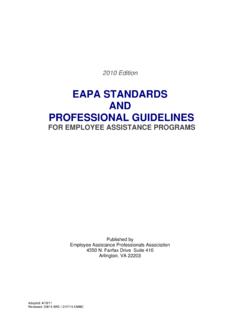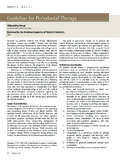Transcription of Guidelines for the Onward Referral of Patients Directly ...
1 Guidance for Audiologists: Onward Referral of Adults with Hearing Difficulty Directly Referred to Audiology Services Produced by: Service Quality Committee of the British Academy of Audiology Key Authors: Hanna Jeffery Suzanne Jennings Laura Turton Date of publication: November 2016. Review date: November 2021. BAA Service Quality Committee Acknowledgements The Service Quality Committee would like to thank all those who provided their opinions on the draft of this document sent out for consultation, including BAA members, The British Society of Audiology, The British Association of Audiological Physicians, ENT UK and The Royal College of General Practitioners.
2 This document is a British Academy of Audiology document and has not been endorsed by any other organisation. Introduction This document is intended to guide Audiologists in service planning and in making referrals for a medical or other professional opinion. Along with Guidelines for Primary Care: Direct Referral of Adults with Hearing Difficulty to Audiology Services (2016)1 , this document replaces the earlier Guidelines (BAA 20092, TTSA 19893,4) and has been approved by the Board of the British Academy of Audiology.
3 This document comprises a set of criteria which define the circumstances in which an Audiologist in the UK should refer an adult with hearing difficulties for a medical or other professional opinion. If any of these are found, then the patient should be referred to an Ear, Nose and Throat (ENT) department, to their GP or to an Audiologist with an extended scope of practice. The criteria have been written for all adults (age 18+), but local specifications regarding age range for direct Referral should be adhered to.
4 This document is intended to be used in conjunction with Guidelines for Primary Care: Direct Referral of Adults with Hearing Difficulty to Audiology Services (2016)1 . Audiology services are expected to make reasonable efforts to make local GPs aware of this guidance and support their understanding of its application. A simple checklist has been included as an appendix, to summarise the criteria detailed in this document. Background In the past, direct Referral Guidelines were written to provide a simple pathway to hearing aid provision for older adults (age 60+) with routine hearing loss.
5 The age range for direct referrals now varies between services. Some Audiology services are taking direct referrals from age 162, but most take referrals from age 18 or age 50. The criteria in this document are well accepted both in the UK and internationally5,6,7. Where no published evidence is available, the criteria have been based on clinical consensus and agreed by the appropriate professional organisations. We recommend further research to provide a robust evidence base to support future guidance.
6 October 2016 Page 2. BAA Service Quality Committee Regional Variation The criteria listed in this document are considered to be best practice. However, the ways that Audiologists receive referrals and the services available for Onward Referral vary according to individual working circumstances and region. Local arrangements may be in place for the direct Referral of other conditions to Audiology, such as tinnitus, balance problems and auditory processing difficulties. Practitioners are encouraged to make use of specialist pathways which may be more appropriate, or can be used as an alternative to ENT.
7 Referral8*. These Referral routes are outside the scope of this document, but Audiology services are encouraged to have additional protocols to allow for regional differences in Referral pathways. Local Guidelines for Referral into some pathways may include specific criteria in addition to those included in this document. Scope of this Document Audiology services are encouraged to have policies in place regarding the Referral of existing hearing aid users into the Audiology service. It is best practice to work with other local providers to ensure a consistent approach when designing these policies.
8 Existing hearing aid users may be referred to ENT on the basis of the criteria in this document. However, detailed guidance on pre-existing conditions, previous investigations and the deterioration of hearing are beyond the scope of this document. Audiology services are encouraged to have policies in place regarding the monitoring of adults with medical conditions which predispose them to rapid deterioration in hearing. October 2016 Page 3. BAA Service Quality Committee Prerequisites for the Assessment of Adults with hearing loss Direct Referral assessments must be conducted by a suitably qualified Healthcare Science Practitioner.
9 For further guidance, see the current BAA Scope of Practice Document8*. This will usually be: A qualified Audiologist, registered with the Registration Council for Clinical Physiologists (RCCP) or Academy of Healthcare Science (AHCS). A Clinical Scientist (Audiology), registered with the Health and Care Professions Council (HCPC). A Hearing Aid Dispenser, registered with the HCPC. This document uses the term Audiologist to refer to all of these roles. Notes on the Onward Referral of adults by an Audiologist If any of the following criteria become evident on assessment in Audiology, a medical opinion should be sought.
10 Depending on local protocol, this Referral will usually be to an Ear, Nose and Throat (ENT). department, Audiovestibular Medicine or to the GP. Where available, this may also be to an Audiology practitioner with an extended scope of practice. The reason(s) for Onward Referral should be explained to the patient and the Referral made only after obtaining their informed consent. Pre-existing and investigated (medical) conditions should be taken into account, if relevant. All findings and advice given must be recorded and the patient's GP informed of the outcome.






